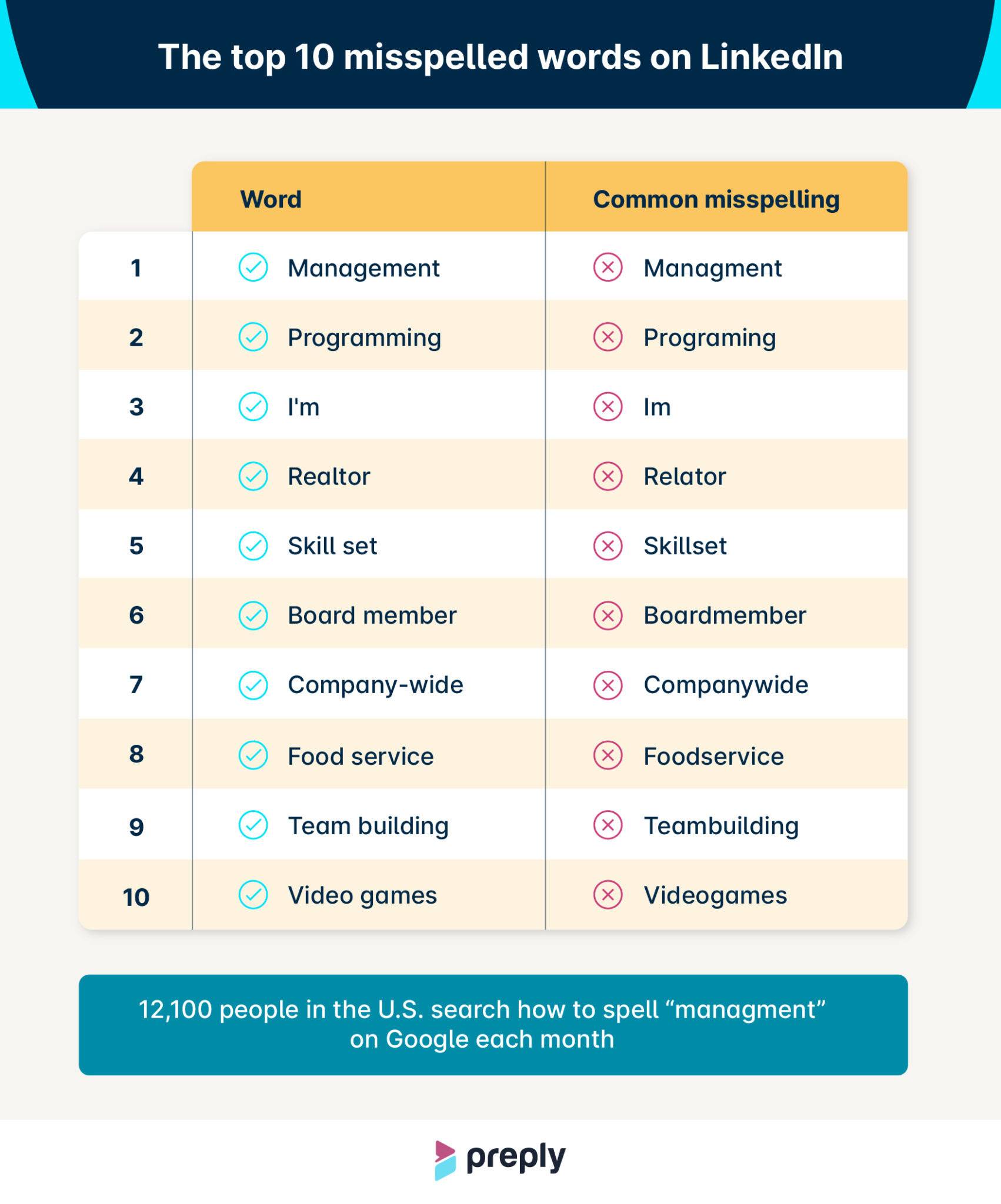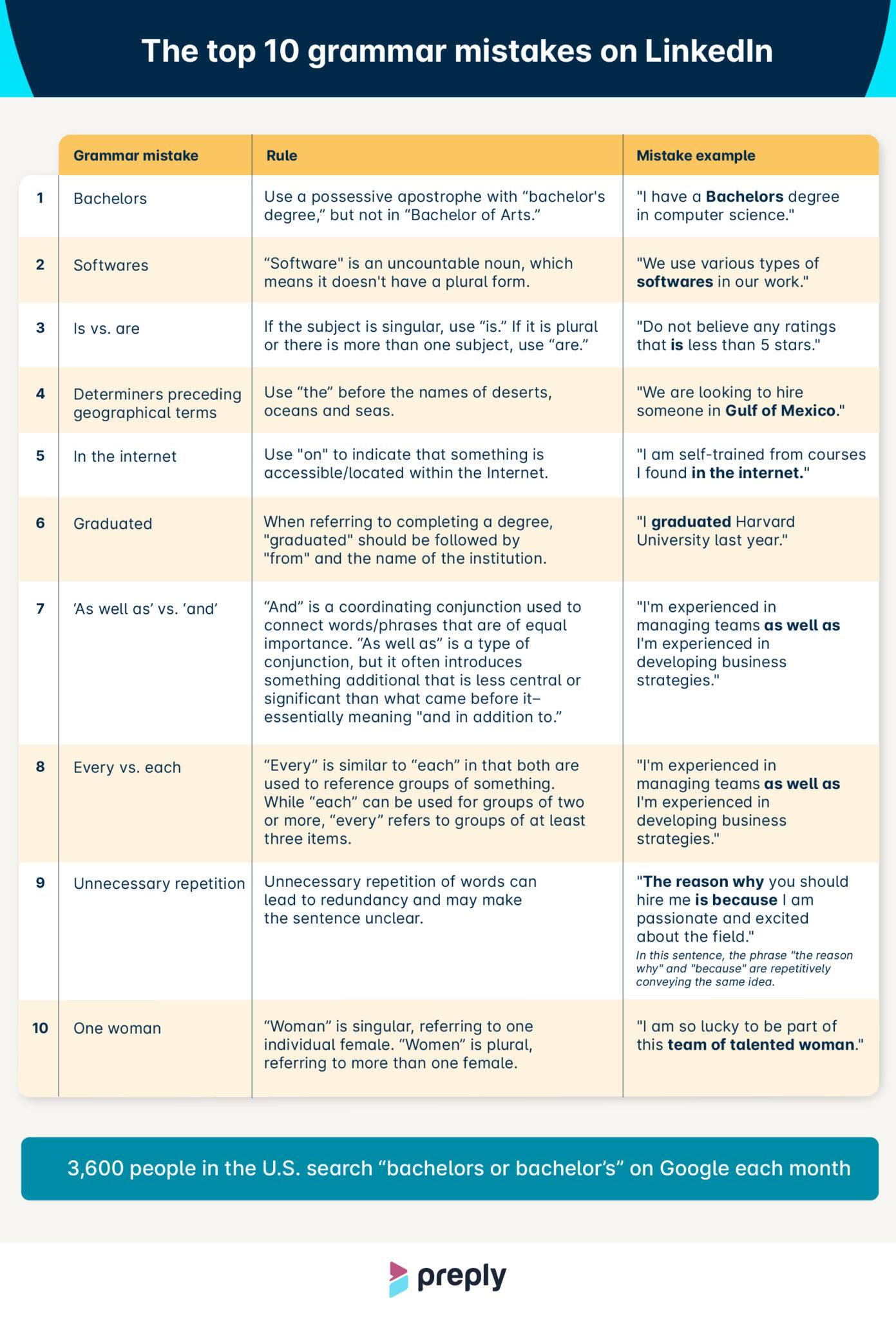This article originally appeared on Preply.com.
In a world where first impressions matter, spelling mistakes on your résumé and professional profiles can drastically undercut your image. Among the multiple platforms where these faux pas might occur, LinkedIn stands out. Your LinkedIn profile serves as an interactive résumé, a testament to your expertise, accomplishments, and overall professionalism. Yet, typos impact how potential employers see thousands of people.
Tutoring company Preply analyzed data from thousands of LinkedIn profiles to identify the top misspellings and grammar errors per industry and overall. Check out the infographic below and keep reading to find out which common linguistic errors are the main culprits (then check your LinkedIn profile to make sure you’re not guilty!).
The most common misspellings on LinkedIn

Created by Preply
Every month, about 12,100 people in the US turn to Google to validate the spelling of “managment,” a misspelling of the word management that frequently appears on LinkedIn profiles. In a similar vein, 1,900 individuals per month Google another spelling quandary: “programing” vs. “programming.” Although the former is not technically incorrect, “programming” is predominantly preferred in common English, so “programing” is more likely to be viewed as a misspelling. “Im,” a misspelling of I’m, emerges as another commonly misspelled word on LinkedIn. This incorrect contraction of “I am”—often used in quick, informal typing—lacks the necessary apostrophe that differentiates I’m from other possible words or acronyms.
According to Preply language expert Sylvia Johnson, misspellings are the result of a multitude of factors, including individual mistakes, pedagogical gaps, and the inherent complexity of English spelling rules. “People may prioritize speed and brevity over accuracy,” she says of typos and lack of attention to detail. However, “Native speakers learn grammar intuitively, and as a result, they may not be aware of specific rules or may not have a deep understanding of them, leading to occasional mistakes. It’s important to note that English spelling rules can be complex and inconsistent, which adds to the challenge of correctly spelling these words.”
The most common grammatical mistakes on LinkedIn

Created by Preply
Effective communication requires English-language proficiency, yet some grammatical mistakes can persistently slip through the cracks. These errors often arise from misconceptions or forgetfulness about basic grammar rules, such as distinguishing between nouns and verbs. Take, for instance, the widespread confusion surrounding the correct usage of bachelor’s when referring to an academic degree. Every month, approximately 3,600 people in the US resort to Google for clarification on whether they need an apostrophe. The word bachelor’s with an apostrophe indicates possession and is usually followed by degree. This becomes further complicated because when it’s used as a plural noun, such as referring to multiple bachelors, no apostrophe is necessary.
In the realm of technology, the term “softwares” is frequently used, despite software being both singular and plural. It’s a common misconception, likely stemming from the instinct to add an “s” for plurality. Many people also grapple with the appropriate use of “is” versus “are.” This simple choice—if the subject of a sentence is singular, use is; if it’s plural, use are—becomes complicated if you don’t know which word is the subject.
Related: How to Be Smart When Building a Strong LinkedIn Profile
Spelling mistakes across industries
Analyzing the profiles of LinkedIn users across 25 specific fields sheds light on common misspellings per industry. In this microcosm of professional communication, even industry-related terminologies aren’t immune from spelling errors. The terms entrepreneur, management, and realtor consistently emerge as common culprits. Google search data indicates that 1,600 Americans each month seek to confirm the spelling of entrepreneur, reflecting its status as a frequently misspelled word.
In the realm of accounting, “accountnat” surfaces as a common error, while the advertising industry grapples with “advertisng.” In the business consulting sector, we see the challenging term entrepreneur misspelled as “entrepeneur.” Likewise, the graphic design industry often fumbles with “prinitng,” a misspelling of the term printing. Higher education professionals sometimes err with “eduction” instead of education, and language schools occasionally present “lanuages” in place of languages.
Similarly, pedagogical is seen misspelled in primary and secondary education as “pedagological,” and “commersial” surfaces in the media telecommunications sector. In the real estate industry, “devlpmnt” appears instead of development, and in the writing and editing sector—a field where precision is key—“communciations” occasionally stands in for communications.

Created by Preply
The issue of misspelled words on LinkedIn underscores a critical point: the importance of accuracy in the professional world. Effective communication, attention to detail, and education can help you whether you’re looking for your first job or networking within your industry.
Read the full article and methodology on Preply, and find more tips on curating your best LinkedIn profile in our Internships and Careers section.







